Occupy Central
Occupy Central is a civil disobedience movement which began in Hong Kong on September 28, 2014. It calls on thousands of protesters to block roads and paralyse Hong Kong's financial district if the Beijing and Hong Kong governments do not agree to implement universal suffrage for the chief executive election in 2017 and the Legislative Council elections in 2020 according to "international standards." The movement was initiated by Benny Tai Yiu-ting, an associate professor of law at the University of Hong Kong, in January 2013.
OCCUPY CENTRAL - DAY 23: Full coverage of the day’s events
Violence in Mong Kok: Are the protests spinning out of control?
Violent clashes between protesters and police have become a regular occurrence in Mong Kok
PUBLISHED : Monday, 20 October, 2014, 6:37am
UPDATED : Monday, 20 October, 2014, 4:36pm
Protesters man the barricades in Mong Kok early yesterday. There have been violent clashes in the area since police reclaimed part of the rally site on Friday. Photo: Sam Tsang
Concerns are growing that the Occupy movement in Mong Kok has spun out of control and is on the verge of turning into a riot, after nights of violent clashes since police reclaimed part of the rally site on Friday.
New clashes erupted between protesters and police in Mong Kok early yesterday, just hours after Chief Secretary Carrie Lam Cheng Yuet-ngor announced that talks with student leaders were scheduled for tomorrow.
Some protesters tried to remove barricades on the junction of Nathan Road and Argyle Street shortly after midnight, prompting officers to warn them against charging police cordons.
Officers then used batons to counter the protesters' umbrellas. At about the same time, police reinforcements arrived and rushed into the protest zone to push the crowds back.
Images of protesters with blood streaming down their faces circulated on social media.
One protester said he saw plainclothes policemen hitting protesters after they moved into the protest zone. "I saw anti-triad officers hitting protesters with batons. Several protesters suffered head injuries and were bleeding. They also dismantled supply stations," said the protester, who gave his surname as Lo.
Another protester blamed police for the violence. I was here last night and the police were hitting the protesters on their heads and arms with their batons. But the protesters were not doing anything," said the 26-year-old elderly care centre worker.
Watch: Injured Occupy Mong Kok protester: Hong Kong police officer hit me
A police source said officers were trained to aim at the torso. "But in reality, due to many factors, it's sometimes unavoidable that the head or legs get hit," the source said.
Labour Party lawmaker Fernando Cheung Chiu-hung told a talk show he was worried. "I have been to Mong Kok many times, and it is on the verge of a riot," he said. "But it is very simple to handle the situation. The government needs to respond to the public's demands."
Winnie Chiu Wai-yin, acting director of the police force's management services, said the Mong Kok protest zone was "very dangerous" with radical elements infiltrating the crowd.
She told people to stop charging at police cordons, and said police "did not want to be embroiled in the political turmoil".
But the Federation of Students' deputy leader Lester Shum said protesters were holding up their hands when their heads were bloodied by police batons.
"If you say this is a riot, it was only caused by police who used force. Only [Chief Executive] Leung Chun-ying is able to control the movement now," he said.
Yvonne Leung Lai-kwok, another spokeswoman for the federation, also denied the movement had spun out of control.
She said that even when some protesters wanted to storm the roads, other protesters tried to stop them. But before they had the chance to do so, the police had used pepper spray, she said.
Secretary for Food and Health Dr Ko Wing-man told the protesters that violence was counter productive. "I am very concerned about the recent direction of [Occupy], especially what seems to be evidence pointing to purposeful violence and attacks in Mong Kok," Ko said.
Dr Au Yiu-kai, medical head of the Occupy Central movement, said his team treated 13 protesters during the latest clashes.
"And seven of them sustained injuries to their heads with blood streaming down their faces. The police were hitting them with their batons. That was not minimum force as the police have claimed," Au said.
"Some of them refused to get treated in hospital because they feared they would get arrested. Hitting people with batons can cause concussion and fracture the skull. It could be fatal."
Police said four men aged 25 to 37 were arrested during the early hours of yesterday on suspicion of assault, possession of offensive weapons and disorderly conduct in a public place.
Police also said three protesters and five police officers were injured.
Hospital Authority figures showed that 20 people were injured from 10pm on Saturday to 6am yesterday due to the Occupy movement.
This article appeared in the South China Morning Post print edition as Spinning out of control?
Fears over 'radicals' as protest violence increases, but sources say Beijing won't be embarrassed into action
Protests getting out of hand, says Leung amid claims radical groups and foreign forces are pushing for city's de facto independence
PUBLISHED : Monday, 20 October, 2014, 6:37am
UPDATED : Monday, 20 October, 2014, 1:11pm
Police in Mong Kok, where protests are more violent. Photo: K.Y. Cheng
Beijing will not seek a quick end to the political turmoil in Hong Kong to avoid possible embarrassment ahead of some important domestic and international events, sources say.
People familiar with central government thinking also said there were "worrying signs" that radical groups in the city were pushing for the city's de facto political independence under the cover of democracy and were "actively collaborating with foreign forces".
For the first time yesterday, the People's Daily linked the Occupy movement to an attempt to seek Hong Kong's political independence. It said in a commentary that the movement's organisers wanted Hong Kong to have "self-determination" and even to be "independent".
READ: Don't take your children to Occupy Mong Kok, police warn protesters after quiet night
Protests in Mong Kok are getting increasingly violent as the political elite gather in Beijing for a four-day meeting today.
Dozens of people, including police officers, were injured in clashes over the weekend.
Watch: Dozens injured in clashes between Hong Kong pro-democracy protesters and police
Many officials, including Chief Executive Leung Chun-ying, have said the movement is getting out of control.
"There are external forces getting involved," Leung told a television talk show. "This is not entirely a domestic movement and it is getting out of hand."
Pan-democrat lawmakers, in a joint statement, said the confrontation resulted from Leung's attempt to clear the rally site in Mong Kok. They urged restraint on both sides.
"It is biased to call this movement 'out of control' or 'riotous'. A vast majority of protesters are peaceful," they said.
Police announced they had arrested a 23-year-old man in Tin Shui Wai on Saturday for posting messages online calling on protesters to charge police cordons and to paralyse the railway.
With ministerial-level meetings of the Asia-Pacific Economic Cooperation (Apec) forum in Beijing just a week away, many are watching how the central government handles the protests.
Dong Likun, a retired senior research fellow at the Institute of Hong Kong and Macau Affairs, a think tank under the State Council's Development Research Centre, said Beijing would not feel embarrassed if the protests continued during the Apec meeting. "In a democratic society, it's normal to see arguments, protests and dissenting voices," he said.
Another mainland policy researcher agreed. "Some [in Hong Kong] may think if they make a bigger noise now, the central government will be under international pressure. But Chinese leaders will make no compromise because what the protesters ask is unlawful," he said. "They will also avoid bloodshed. As long as we operate within the framework of the 'one country, two systems' principle, no foreign country can fault China on this."
Dong said Beijing "cannot concede anymore or Hong Kong will be back under a foreign power's control". "I think the central government will reconsider its policies towards Hong Kong ... we have stressed too much on 'two systems' and not enough on 'one country'," he said.
- Televised talks between the Hong Kong government and students have been scheduled for 6-8pm tomorrow. Alex Chow Yong-kang, secretary general of the Federation of Students, said the time would enable more people to watch the coverage live. He said Occupy Central founders and Scholarism had been invited to watch from an adjacent room.
Beijing has full confidence in me, Leung says
Chief Executive Leung Chun-ying has claimed that Beijing has "full confidence" in his ability to handle the ongoing protests.
Speaking in an interview with ATV World that aired last night, Leung said: "Hong Kong has been fortunate so far that the Hong Kong government, and myself included, have such high level of confidence and support."
Leung noted that "external forces from different countries from different parts of the world" had taken part in the Occupy movement. He rejected the term "crackdown" but said clearing the roads was "a matter of time".
While his popularity has reached an all-time low, Leung did not see himself as a divisive figure. "Not at all. In fact I have achieved quite a few things, particularly in relations between Hong Kong and [the] central authorities," Leung said. "I probably have to do more communicating."
But he refused to say whether he would seek a second term in 2017- although in the same television programme last year, he did indicate his intention to do so.
As for the government's dialogue with students that is to take place tomorrow, Leung reiterated there was no room to accommodate demands for public nomination in the 2017 election.
Meanwhile, Lingnan University president Cheng Kwok-hon, picked by the city's eight universities to moderate tomorrow's meeting, said he would act impartially and his role would have "nothing to do with what I said in the past". Cheng was an adviser to Leung's 2012 election campaign.
Separately, Alex Chow Yong-kang, of the Hong Kong Federation of Students, called accusations that foreign forces were behind the protests "a complete fabrication". He said the protests would continue until the government tabled a "feasible" reform package.
Joyce Ng
This article appeared in the South China Morning Post print edition as Fears over 'radicals', but Beijing stands firm
Just how revolutionary is Hong Kong's 'umbrella movement'?
Stefan Auer says leaders of Hong Kong's 'umbrella movement' would be wise not to see the 1989 fall of communism in Europe as a sign of things to come
PUBLISHED : Monday, 20 October, 2014, 2:58pm
UPDATED : Tuesday, 21 October, 2014, 2:27am
It tends to be forgotten that communism's fall in Central and Eastern Europe was instigated by non-revolutionary civil society movements. Photo: Bloomberg
The spectre of a "colour revolution" is haunting Hong Kong. Leaders of the "umbrella movement" are adamant that what they have initiated is not yet another such revolution. They are keen not to frighten the rulers in Beijing and the local administrators. To be sure, the events in Hong Kong are unique. Yet theirs is a non-revolutionary revolution, echoing the tradition of non-violent revolutions in Central Europe of 1989, of which the colour revolutions are rightful inheritors.
It tends to be forgotten that communism's fall in Central and Eastern Europe was instigated by civil society movements that prided themselves on being non-revolutionary and anti-political. Central Europe's dissident intellectuals stressed their aim was not to change the political system in their countries, or their eternal alliance with the Soviet Union. But they ended up doing both.
One of the turning points in recent European history was surely June 4, 1989 - the first semi-free elections held in Poland. They were not free - all the seats for the lower house were still reserved for communist party members; only the upper house was to be elected by popular vote. Yet the results were so devastating for the party that they led to a massive delegitimisation of the rulers in the republic.
The rest is history: other countries in Central and Eastern Europe followed and, by the end of 1989, the Soviet empire was no more. In 1991, even the Soviet Union proper disintegrated. The Chinese leadership will have learned its lessons from this story.
Strangely, the velvet revolutions in 1989 were lawful revolutions. To prevent chaos and anarchy, they sought to maintain the fiction of legal continuity.
The nations of Central Europe have been largely successful in transforming their political and economic systems into a Western-style democracy, but Russia and other nations emerging out of the Soviet Union began on a messy path of development that weakened them. In response, Ukrainians sought to fix their corrupt regime - not to institute a new one - in their "orange revolution" of 2004.
For Vladimir Putin, the Soviet Union's demise was the greatest geopolitical tragedy of the 20th century. The threat of a "colour revolution" was also a wake-up call for him. His regime has been solidified by increasingly autocratic methods, partly in response to the Ukrainian revolution. He continues to preempt any chance of public mobilisation against his rule by painting rivals as "colour revolutionaries" funded by the West and betraying the people's true interests.
This is where Putin's interests collide with Beijing's. While 1989 is commemorated in Europe as the rebirth of freedom, June 4 has a different meaning in Beijing (none) and Hong Kong (the Tiananmen Square massacre).
Hong Kong's student leaders might have been prudent to disown the legacy of the velvet revolutions and their more recent coloured reincarnations. Moscow in 1989 was no longer intent on keeping the integrity of its empire intact. Beijing in 2014 shows no signs of willingness to have its empire challenged. If it was forced to choose between two systems and one country, the choice would not be to the liking of democratic forces in Hong Kong.
Stefan Auer is an associate professor in European studies and programme director at the University of Hong Kong School of Modern Languages and Cultures
This article appeared in the South China Morning Post print edition as No repetition
Occupy movement creates marketing nightmare for luxury brands
Today's student may be tomorrow's luxury customer, meaning brands need to rethink how they engage this new Hong Kong demographic
Today's Hong Kong university student is likely to be tomorrow's luxury customer and their new values have to be understood.
We will never be able to look at our students and young people in the same way again after the last three weeks of Occupy Central protests.
Exactly how Hong Kong has been changed will deeply affect the economy and businesses.
As in any civil and political war, everyone has been forced to choose sides. And while many citizens are hoping for Hong Kong to return to normal, it will be a new normal.
Thousands of these young protesters have altered the assumptions of a demographic that was previously thought to be blindly obedient to tycoons and authorities.
German philosopher Georg Wilhelm Friedrich Hegel described that the "master and slave relationship" only existed because the slave allowed it. And it would only end when the slave, not the master, decided to end his or her enslavement.
For better or worse, the students have decided to reject the status quo and chart an unknown course. No longer shackled by the experience of their elders' Hong Kong refugee legacy, they want what they deserve. And they want it now - at internet, social media speed.
Occupy's yellow umbrella is the symbol used to galvanise people to the cause.
But there's no better symbol of the city's class struggle than its high society magazines, especially Hong Kong Tatler and Prestige.
In the pre-Occupy Hong Kong era, they embodied the city's unique, aspirational capitalism.
Today, they could soon become objects of contempt that seem irrelevant to what and who is important to this city. It will dramatically affect how luxury brands engage their next generation of customers.
Their monthly gallery represents people who are blithely detached from Hong Kong's crisis. They embody the lifestyles of the rich and aimless, people who embody the Marie Antoinette "let them eat cake attitude".
The wealthy featured in Tatler and Prestige seem to believe that only their wealth and power are critical to the future of Hong Kong; they are endlessly amused with themselves and oblivious to our crisis.
Sadly, they demonstrate what counts for success and plagues Hong Kong's oligarch economy - being born or married into money. Their vanity is impervious to the outside world. Their gargantuan egos, their petty jealousies, their catty feuds, their commitment to frivolity at all costs - this is Hong Kong high society at its most luridly monstrous, with lots of shopping.
Yet, these are the people that could become the enemy of the people in the class struggle that has broken out.
The youth of Hong Kong is now self-aware of what is truly important to its future livelihood and unlikely to be part of this social-climbing circus of envy.
Hong Kong's youth is the future of its middle class and their enlightened beliefs have created a marketing and demographic schism.
Hong Kong's rich are no longer heroes to be admired and emulated ... they are loathed
Next season's designer watch is not the only thing on their minds. New values are percolating through their own "peace-in" version of the "love-ins" of Woodstock and Glastonbury. The so-called spirit of high society now exudes the distinct scent of economic and political oppression.
Such a serious change in perception has serious implications for how luxury brands are marketed in Hong Kong.
Besides demonstrating how a series of organised protests could affect an entire city's economy, an openly fought, long-term class struggle doesn't make a hospitable home for luxury shopping.
Today's Hong Kong university student is likely to be tomorrow's luxury customer and their new values have to be understood. Prestigious brands from fashion to wealth management need to rethink how they engage this new demographic.
The demonstrations have also showed how social media has emerged as a supremely scalable force for precisely targeting and reaching the right audience.
Super serve your followers and ignore the rest and the result is that you will always possess a 100 per cent market share. That explains Occupy's marketing success.
Hong Kong's rich are no longer heroes to be admired and emulated. They are no longer feared or respected. Instead, they are loathed.
And that is an utterly dangerous proposition for brands that are trying to leverage their patronage for future followers.
Prestige or Tatler need to feature Joshua Wong on their covers as the most important new member of Hong Kong's elite and most exciting brand ambassador.
Peter Guy is a financial writer and former international banker
This article appeared in the South China Morning Post print edition as Luxury brands out of step in new world
Hong Kong Leader Reaffirms Unbending Stance on Elections
HONG KONG — The Beijing-appointed leader of Hong Kong, Leung Chun-ying, said Monday evening that it was unacceptable to allow his successors to be chosen in open elections, in part because doing so would risk giving poorer residents a dominant voice in politics.
Mr. Leung made the statement during a broad-ranging defense of his administration’s handling of pro-democracy protests that have disrupted the city for more than three weeks.
In an interview with a small group of journalists from American and European news media organizations, his first with foreign media since the city erupted in demonstrations, he acknowledged that many of the protesters are angry over the lack of social mobility and affordable housing in the city. But he argued that containing populist pressures was an important reason for resisting the protesters’ demands for fully open elections.
Instead, he backed Beijing’s position that all candidates to succeed him as chief executive, the top post in the city, must be screened by a “broadly representative” nominating committee appointed by Beijing. That screening, he said, would insulate candidates from popular pressure to create a welfare state, and would allow the city government to follow more business-friendly policies to address economic inequality instead.

Mr. Leung’s blunt remarks reflect a widely held view among the Hong Kongelite that the general public cannot be trusted to govern the city well. His statements appeared likely to draw fresh criticism from the democratic opposition, and to inflame the street struggle over Hong Kong’s political future.
Representatives of his government are scheduled to hold televised talks with student leaders of the protests, who have said that Mr. Leung was defending a political system stacked against ordinary citizens.
Mr. Leung said that if “you look at the meaning of the words ‘broadly representative,’ it’s not numeric representation.”
“You have to take care of all the sectors in Hong Kong as much as you can,” he said, “and if it’s entirely a numbers game and numeric representation, then obviously you would be talking to half of the people in Hong Kong who earn less than $1,800 a month.”
“Then you would end up with that kind of politics and policies,” he continued.
MAP
Areas of Skirmishes and Protests in Hong Kong
The pro-democracy protesters have occupied parts of Hong Kong for more than three weeks.

Mr. Leung, who has received repeated backing from the Chinese Communist Party’s leadership, argued that the way to remedy social grievances was to expand the supply of housing and spur economic growth. He stressed the importance of maintaining the confidence of Hong Kong’s corporate elite, saying that was one of the goals of the city’s Basic Law, written a quarter-century ago after Britain handed sovereignty over Hong Kong back to China.
Mr. Leung spoke at Government House, the ornate mansion that served for more than a century as the official residence of British colonial governors and is now the chief executive’s residence. He said it had been remodeled recently so that he and his top aides could work there while protesters were besieging his offices downtown. “We didn’t miss a beat,” he said.
Mr. Leung was appointed in 2012 after being endorsed by a 1,200-member committee of prominent Hong Kong residents. Critics say that committee was packed with Beijing’s supporters, but Mr. Leung said it was also broadly representative, as required in the Basic Law, because it included people in different professions, economic strata, religions and other segments of society.
One group he said he wooed on the committee were the 20 members chosen by sports officials and coaches. “If it was an entirely universal suffrage election,” Mr. Leung said, “then the sports community would not count, they would not feature on my radar screen.”
He also raised again the suspicions of his government and of Beijing that “foreign forces” had played a role in the street protests, although he declined repeatedly to identify those forces or provide any examples. “I didn’t overhear it in a teahouse, and it’s something that concerns us,” he said. “It’s something that we need to deal with.”

A tenacious protest movement has spread beyond its initial student base to embrace discontented middle-class and blue-collar residents. But they face an unyielding Chinese Communist Party leadership, which has said the demonstrators have no chance of securing their demands.
Mr. Leung said he has tried to avoid letting standoffs between the protesters and the police escalate into anything that might echo the Tiananmen Square crackdown in Beijing in 1989. Protesters have accused the Hong Kong police of using excessive force in beating them back with pepper spray and batons. Mr. Leung said that he hoped the “dialogue” scheduled for Tuesday between student leaders and five of his top aides would help ease tensions.
Protesters have continued to call for Mr. Leung’s resignation or ouster, both over the police’s tactics against the demonstrators and over accusations of financial impropriety surrounding a business deal he made with an Australian company before he took office.
Mr. Leung’s opponents say he accepted $6.4 million from the company over the past two years and did not report it. He says the deal was legitimate and that he had no legal obligation to declare the income.
Mr. Leung offered several thinly veiled warnings on Monday that it was risky for the protesters to try the patience of the national authorities.
“So far Beijing has left it to the Hong Kong government to deal with the situation, so I think we should try our very best — and this is myself, the government and the people of Hong Kong — should try our very best to stay that way,” he said.
“Challenging myself,” he continued, “challenging the Hong Kong government, at these difficult times will do no one any service, will do Hong Kong’s high degree of autonomy no service.”
梁振英接受〈紐約時報〉訪問全文
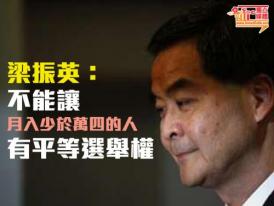
紐約時報:香港特首重申就選舉和經濟問題的強硬立場
By KEITH BRADSHER and CHRIS BUCKLEY
By KEITH BRADSHER and CHRIS BUCKLEY
OCT. 20, 2014
香港——由北京委任的香港行政長官梁振英,於星期一晚間表示,由公開選舉取得最多票數選出他的繼任人是不可接受的,因為這樣會導致較窮的市民成為主導政治的聲音。
梁振英在處理已歷時超過三星期的民主示威時,提出這個警告。他承認很多示威者因為香港缺乏社會階級流動和樓價過高而感到憤怒,但他強調民粹壓力是他抗拒示威者訴求的重要原因。
他堅定地維護北京的立場,表示他的繼任人必須由有「廣泛代表性」的提名委員會篩選,從而可讓下一任行政長官抵禦公眾壓力,避免成為福利國家的模式,亦可讓政府實施對商家更有友善的政策,從而處理經濟不公的問題。
梁振英的直率評論,似乎反映香港精英的普遍看法,認為不能信任一般大眾管治這個城市的能力。他的論點,有可能會招致民主反對派新一波的批評,再次燃起尤其因對經濟不滿而由年輕一代帶動的街頭抗爭,要求改變香港的政治未來。
在電視直播政府與學生領袖對話的前夕,他作此番言論,顯示他在捍衛與一般市民對立的政治制度。
梁振英說,若「你去看『廣泛代表性』的意思,這不是以數字來衡他說:「你要盡量照顧香港各階層,若這完全是數字遊戲,由多數人決定,你一定會爭取月入低於1800美元那半數香港人的支持。」
他續道:「這樣,你最後的政治政策,亦會傾斜到這部份人。」
多數獲中國共產黨領導肯定的梁振英,表示補救社會不滿的方法,應從擴大房屋供應和刺激經濟增長著手,方可解決社會階層向上流動停滯不前的問題。他強調維持香港商界精英信心的重要,並指出四份一世紀前草擬的香港基本法,目標實為維持商界信心,抵抗公眾要求歐洲式福利國家體制的壓力。
禮賓府裡有大面積的花園,俯瞰可見香港市中心,過去超過一世紀一直為英國委任的港督官邸,直至1997年香港主權移交中國,現成為香港行政長官的官邸。因房地產交易而有數百萬美元進帳的梁振英,就在禮賓府的水晶吊燈下,說了這一番話。
梁振英說,禮賓府最近進行過改建,好讓他和他的高級助手在示威者圍攻他的政府總部辦公室時,可以在此工作。就禮賓府改動工程的決定「我們沒有絲毫延遲」,這讓香港的高官們可以對示威者更顯忍耐。
梁振英在2012年獲1200人的選舉委員會選出,批評者指出這個選舉委員會大部份議席皆由北京支持者把持。但是,梁振英表示這也符合基本法的「廣泛代表性」定義,因為選舉委員會成員來自不同經濟界別、專業界別、宗教團體及社會其他階層。
梁振英舉例說,為了爭取當選行政長官,他極力爭取其中20名由體育教練和其他體壇界別選出的選舉委員支持。「如果這是完全普及的選舉」,即一人一票,「我就不會花這麼多時間與體育界的成員傾談,他們不會在我的雷達範圍內。」
他也再次提出他的政府和北京對街頭示威有「外國勢力」參與的懷疑,雖然他多次拒絕指出是哪些勢力或提供任何例子。「這不是我在茶室聽回來的,而這令我們很關注。」他說,「這是我們需要處理的。」
他也再次提出他的政府和北京對街頭示威有「外國勢力」參與的懷疑,雖然他多次拒絕指出是哪些勢力或提供任何例子。「這不是我在茶室聽回來的,而這令我們很關注。」他說,「這是我們需要處理的。」
這場頑強的抗爭運動已從學生發起擴展到對現況不滿的中產和藍領市民,但他們面對不肯妥協的中國共產黨領導層。中共領導層已表明,示威者的訴求不可能實現。
現任或前任香港官員和不同專家在上星期的訪問指出,無論梁振英的民望多低,北京也不會讓他下台,因為這將造成政府高官仕途由街頭示威決定的先例。
星期一晚,梁振英表明支持北京就選舉制度只作些微改動的決定,令只有獲北京首肯的候選人可以參選。梁振英拒絕民間公民提名的建議,說這些建議違反基本法。
星期一晚,梁振英表明支持北京就選舉制度只作些微改動的決定,令只有獲北京首肯的候選人可以參選。梁振英拒絕民間公民提名的建議,說這些建議違反基本法。
但是,談到示威者和警察對峙,他們偶爾擦槍走火爆發混戰,梁振英也嘗試避免對峙發混戰的演變成像北京天安門鎮壓的衝突,縱使規模比當年小很多。示威者指責香港警察使用過份武力,用胡椒噴霧和警棍襲擊示威者。
梁振英表示,他希望星期二舉行的五名高官與學生領袖對話可以緩和緊張局勢。但是,在上周末,街頭示威者與政府的僵局加深。上星期五晚,示威者重奪旺角一條街道,以抗衡當天警察清場並清走示威者的帳幕和路障。
有關梁振英不當收受款項的指控,由一澳洲報章首先報道,令示威者要求梁振英下台的聲音更強烈。澳洲公司UGL在2011年梁振英獲委任為行政長官前,同意向梁振英支付一筆六百四十萬美元的款項,以收購當時梁振英任職的一家公司。這筆款項在梁振英任職行政長官的兩年間支付。
梁振英的反對者指責他收取這筆款項乃行為不當,而且未有申報或就這筆收入繳付稅項,但他和UGL表示,這筆款項乃正當交易,而梁振英表示法律沒有規定他必須申報這筆款項。
梁振英就普選引致窮人受惠的擔憂,與北京清華大學法學院院長王振民的評論一致。王振民過去一直就香港問題向中央政府提供意見,8月28日,王振民被派來港解釋北京政策,作出有關評論。
王振民警告,若所有成年人可以在公開的選舉投票,會損害商界的利益。
「他們分到的餅會因為普選被其他人蠶蝕,所以我們必須充份考慮各方的擔憂。」他說。
「他們分到的餅會因為普選被其他人蠶蝕,所以我們必須充份考慮各方的擔憂。」他說。
梁振英表示,他明白市民對高樓價和高物價不滿,急需解決,但他也強調,相對於財富再分配的福利政策,加速經濟增長才是提供向上流動機會的重點。
他說:「房屋短缺問題愈來愈嚴重,到了有年輕人結婚卻要分開居住的地步,這是不能接受的。」
他說:「房屋短缺問題愈來愈嚴重,到了有年輕人結婚卻要分開居住的地步,這是不能接受的。」
梁振英也多次婉轉地警告,雖然北京嘗試不直接干預香港,但試探中國政府的耐性,風險很高。
「直至現時,北京讓香港政府處理事件,所以我們,包括我、香港政府和香港市民,應盡力維持這種方式。」他說。
他續道:「在這困難時刻,挑戰我、挑戰香港政府,對任何人沒有好處,對香港高度自治也沒有好處。」
原圖:蘋果日報
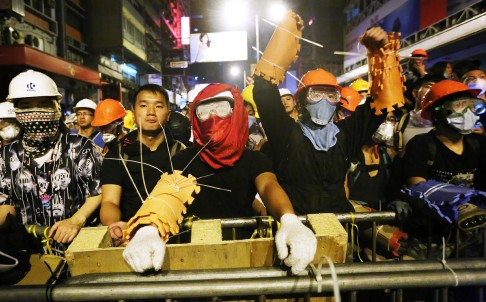
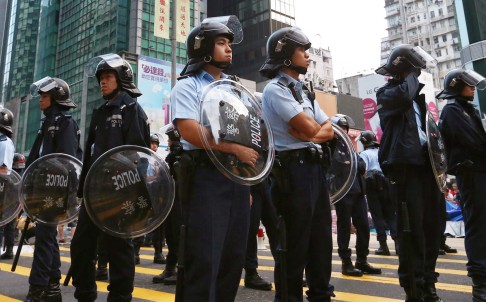


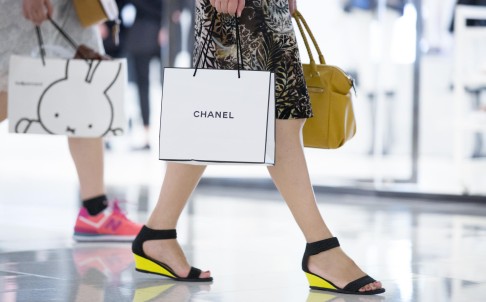
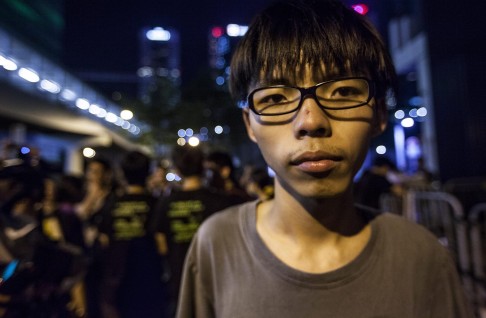
沒有留言:
張貼留言